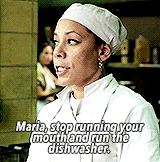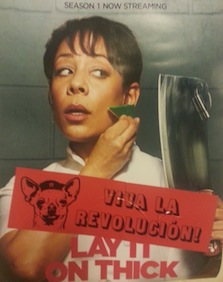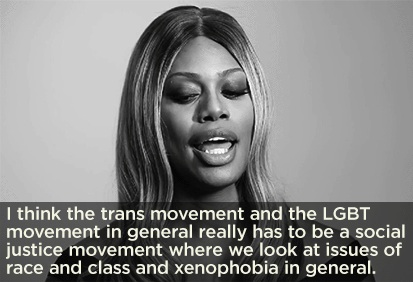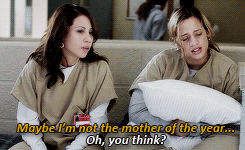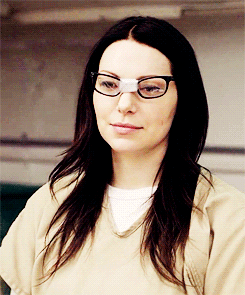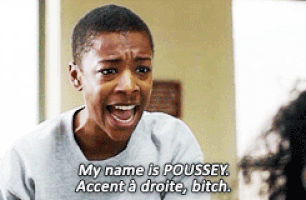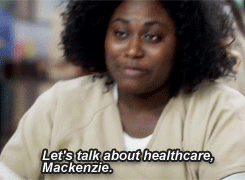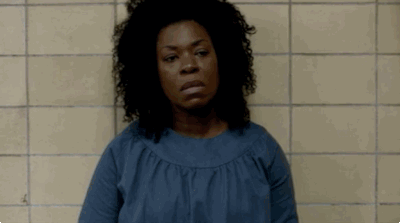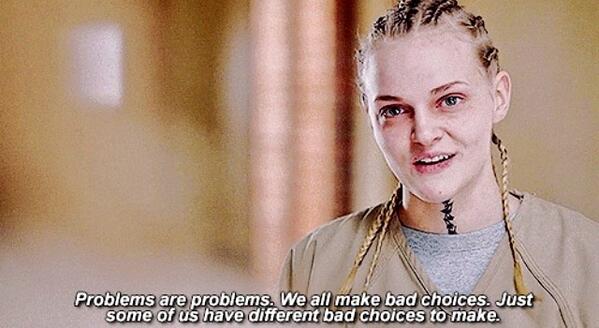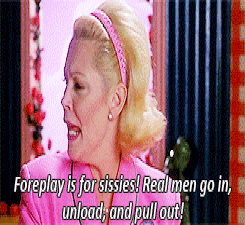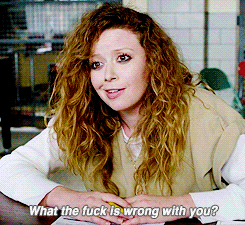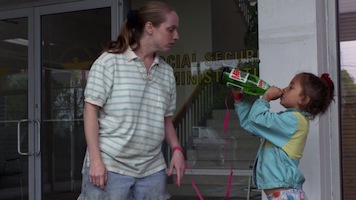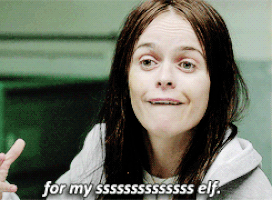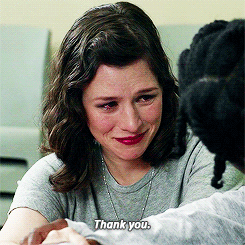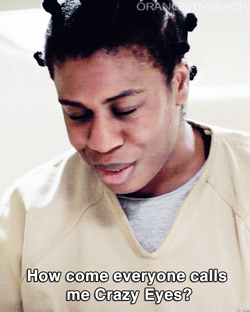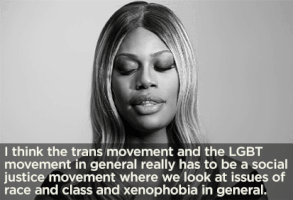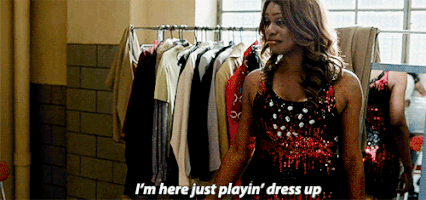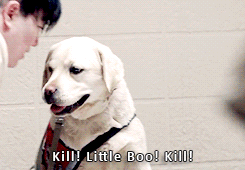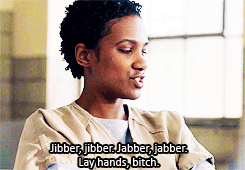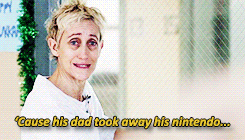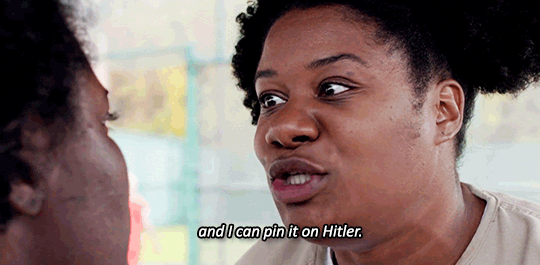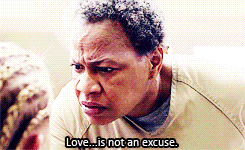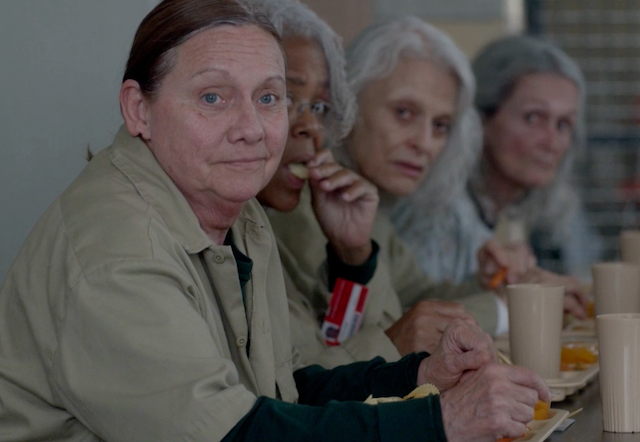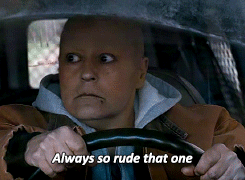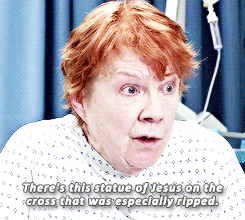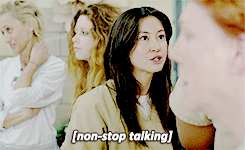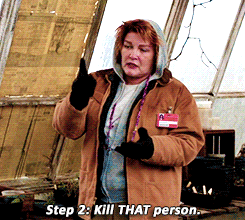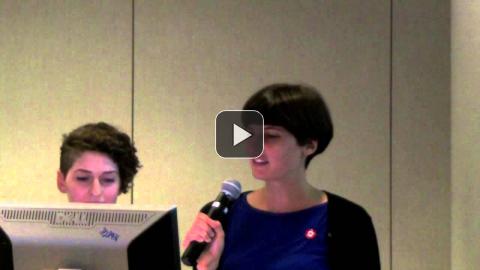We learn in season 3 that Nicky ended up in jail for boosting a taxi and crashing it while rushing to get to her heroin connect. This is no doubt an allusion to Natasha Lyonne's first bout of public infamy when she crashed into a taxi in Miami. It wouldn't surprise me if she came up with the storyline herself, both because of her intelligence, and the sense of humor and openness with which she treats her life. I saw she even tweeted (in a friendly way) at Michael Rapaport recently. She seems highly evolved.
Before I discuss Nicky (and Natasha Lyonne) in the context of socialism and legalized drugs, let's talk about capitalism's relationship with celebrities. While Lyonne's ability to be self-deprecating is admirable, the (for profit) media industry culture that treats celebrities' foibles with ridicule instead of compassion is deplorable ( which isn't even worthy of capitalization).
Telepictures Productions owns tmz. Warner Bros. owns Telepictures. Hence, Warner Bros. owns tmz. That's worth repeating: Warner Bros. owns tmz. The 3rd largest film and television production company in North America also owns a company that stalks, scavenges, and sensationalizes the very entertainers who make WB a powerhouse. For bonus fun, consider that Warner Bros. is owned by Time Warner, the 3rd largest media company in the world.
The issue is industry wide; tmz just serves as a perfect example. This is also a means of controlling the behavior of (wage slave) entertainers. If you step too far out of line, the industry will sic their vultures on you. I suspect entertainers are also afraid of speaking out against the vulture media apparatus because they fear studios will label them as "difficult" and not want to work with them.
"Wage slavery is a bullshit way to live." - My tombstone.
Under socialism, the wealth and means of production will be more evenly distributed. Entertainers will no longer be forced to work for capitalists (large media companies) in order to "earn" a living. Independent filmmakers and actors will have much more artistic freedom, instead of being stuck working for capitalists who value profit over people and art.
This means there will be less concentrated wealth for producing big budget superhero movies (and all their sequels and remakes). It also means there will be more true art like "Slums of Beverly Hills" and "Orange Is the New Black." That's exactly what I want, and I hope you agree.
Socialism won't solve all problems, but it will provide a better environment for us to further solve problems and evolve. Alongside and within that environment, cultural and interpersonal work will always be mandatory ingredients for our evolution, and OITNB is the pinnacle right now. The political and cultural movements can't exist nor succeed without each other.
The purpose of "The Socialists" is to ignite both of these movements by filling in the political-economic (class) void, and extending OITNB's cultural work (class, void, extend…for my computer programmer comrades).
With this entanglement in mind, let's discuss the cultural side of the celebrity coin in terms of audience-entertainer relations. We should treat celebrities the same way each of us wants to be treated. A person's right to privacy shouldn't be diminished because they're an entertainer, an athlete, or a politician.
If you had a drug addiction, would you want it plastered all over the place? While the media is to blame for treating celebrities as spectacle, the public shares some blame for feasting on the spectacle. While a reduction in the supply of celebrity gossip will reduce the demand for it (just like drugs), I believe a social movement focused on compassion and mindfulness can also alter behavior.
Many people I'm sure were concerned when they read Natasha Lyonne had a drug problem. But do you think the media outlets reporting on her situation cared more about her well-being, or the amount of eyeballs and profit the story would bring them? Do you think reading the stories helped her, or helped the media companies? Who had her best interest at heart: the new york post when they called her a cracktress, or the medical/health professionals and people who loved her like Chloë Sevigny who helped her recover? If the people who cared most about her didn't feel publicizing the story would help her, then we probably shouldn't have been reading about it.
There's also the aspect of people digesting the story because Lyonne's struggles made them feel better about their own problems. This is a necessary teaching point of revolutionary movements: your struggles do not dissipate when you revel in the struggles of others. People need to liberate themselves from this psychological trap.
Entertainment news can be useful. I don't follow Christopher Nolan on Twitter, but I always want to know when he has a new movie coming out. What I don't want to read is gossip about who is dating whom and the like. These are people's private lives. Let them choose which details they want to share publicly. How can you blame celebrities for wanting to hide and seclude themselves (in places like Beverly Hills)?
These entertainers bring joy to our lives and we want them to know, but many times the best thing you can do (if you really care about them): leave them alone. They will be happier people, and will actually appreciate their fans more. There are appropriate venues for expressing admiration. Scheduled public appearances are one. Another is Twitter, which I like because it allows fans to express admiration from a safe distance, and celebrities to choose their level of interaction. However, we shouldn't castigate celebrities who don't do public appearances, don't interact on twitter, and don't want to talk to random strangers in the street. That's their right, just like yours and mine.
I said we shouldn't have read all this stuff about Natasha Lyonne, yet clearly I read it...and now I'm writing about it. Am I not a hypocrite?
.
When I saw Natasha Lyonne's name in the opening credits for OITNB, I . Then I saw her and . I hadn't seen her in about 15 years, since Slums of Beverly Hills. Looking at the list of her work on IMDb, I was very surprised she wasn't a bigger star.
Was she more of a theater actor? Was it her looks? I looked at her bio to try to figure this out. There I saw her quote about her "well-publicized drug problem," and I understood.
Why didn't I just drop it? Because at that moment it dawned on me that she was perfect for the main character of The Socialists. My motivation shifted from curiosity to research. I wanted more information about her so I could craft a character that she'd love. The more I learned through her interviews, the stronger my belief grew that her involvement will make The Socialists the best show it can possibly be. I believe she can bring a lot more to the table than just acting.
In the 4 months since this realization, I:
- Wrote the pilot episode of The Socialists.
- Moved (drove) cross country with all my shit from LA to Philly.
- Made a 90 minute, 27 segment video series: Socialism & OITNB.
- Built this website.
- Produced this (much better) 24 segment written version of Socialism & OITNB.
All of this was inspired by Natasha Lyonne. I'd much prefer to contact her directly about this project, rather than writing a public article like this. I sent the script to one of her agents who I thought had the best chance of reading it (the one with the least famous clients). That went nowhere, since I'm sure they're deluged with scripts for Lyonne, and they're not going to look at something from an unknown like me. I also tried contacting someone she knows who is more publicly accessible, and who I want involved in the project as well, but that went nowhere because no one knows who I am.
I have to do something that makes me stand out from the thousands of Tweets she gets every day, while doing my best to maintain courtesy and boundaries. I suspect she'll understand why I've pursued unconventional means, and that my intentions are positive and respectful; she seems cool like that.
Was the new york post trying to start a revolutionary social/political movement when they called her a cracktress? You see the difference between them and me, right?
That was intense, so here's some levity before we move on to drugs. I don't have a Netflix subscription, so I've never actually seen OITNB. On an unrelated note, I have a question about this word I keep hearing: whadda you know about "torrents" Vivian? The only Torrance I be knowin' is a city in Los Angeles that the Abramowitz family discussed moving to -- .
Socialism will create an environment which includes that value compassion, outreach, and rehab instead of greed and punishment. Long story short, all drugs should be legalized and regulated.
I covered the logic of rehab over prison for drug addicts in the Tricia segment. I'll just briefly add to that how the importance of people who love and care about you cannot be overemphasized in overcoming addiction. As I referenced above, Natasha Lyonne credits her best friend Chloë Sevigny, not the vulture media, with helping her through her addiction. Love and compassion vs. greed and punishment, enough said.
We don't know how Nicky got into drugs, but I thought of 4 pathways to drug addiction. I'm not saying there aren't others, but these are the ones I'm able to empathize with from personal experience. The first is peer pressure. The common example is when you want to be accepted by a group of people who are doing something you've never done (like drugs). A more powerful version is when it involves a person you are sexually attracted to, especially if you are alone with that person.
My personal experience with peer pressure is that I was often surrounded by friends doing shrooms, K, and X, but I had no desire to do those drugs, nor desire to impress anyone by doing those drugs. However, I never encountered the situation of being alone with someone I was attracted to who was using/offering anything stronger than weed. I wonder how things may have turned out differently had I been in that situation, and I suspect this has led many people down a dangerous path.
In relevance to this article, socialism , and will improve human relations (see Vee's segment). This will provide more freedom for us to put ourselves in situations where we are more likely to meet people we connect with, and there will be more people we connect with in general.
I'm certain that I would be an accomplished musician, writer, and actor if I didn't have to spend my youth and college years focusing on getting a good job for survival when I became an adult. And subsequently spending my young adult years either grinding out a living at jobs I hated, or begging for opportunities to work jobs I would hate.
We don't know what Nicky's activities were before prison (other than drugs), but we know Natasha was/is an actor and producer. I'll assume Nicky's youth was somewhat similar to Natasha's, due to the parallelism of other parts of her life. If I was an entertainer, in my youth, in New York, at the same time as Nicky/Natasha, I think there's a very good chance we would have known each other and become friends. We're too similar for our paths to not have crossed. And frankly, after seeing Slums, I would have done everything I could (with respect) to make sure our paths crossed (this is pretty obvious based on what I said earlier about the last 4 months.)
Would my perspective on respecting the quality of my brain, and her brain, lead her to make different choices? Or would her willpower outweigh mine and pull me into addiction? Would we make the same choices, and go our separate ways? I consider myself fortunate that I was never put in that situation, but part of me laments the lack of opportunity to help someone stay away from it.
The 2nd pathway to addiction is depression. There was one time in my life when reality was too difficult to handle and I felt I had to smoke weed. I did, and I was glad I had it. However, if you feel like that all the time, then the buzz won't last, and you'll need to move on to harder drugs. Socialism will reduce incidence of depression, which will in turn reduce this phenomenon of people moving on to harder drugs and getting addicted.
The 3rd pathway to addiction is physical pain relief. Much like mental pain relief (depression), if you take painkillers for long enough, you will get addicted. Socialism will combat this kind of addiction a few ways. Increased automation means fewer physical laborers, which means fewer people getting hurt at work and needing pain relief.
For-profit pharmaceutical companies will have a much harder time flooding the market with addictive drugs. They will no longer have the concentrated wealth necessary to do this. They will also have to compete with publicly funded medicine which focuses on social need, rather than creating addictions to produce profits.
The 4th and final pathway to addiction is performance enhancement. I'm speaking specifically about artists in relation to my own experience with music and writing. Getting high can enhance creativity and passion. It can also take over your life very easily.
I suspect that Scott Weiland and/or Layne Staley may have fallen into this trap (among many others). This is pure guesswork, I haven't done any research on either of them. I'm just a big fan of STP and AIC and am referencing their unfortunate addictions to illustrate a point.
If you're on a long tour, playing the same songs night after night, I can imagine it's easy to lose some of the passion for playing. You don't want to let your fans down, so you get high to give the fans the performance you feel they deserve. Similarly, if you're in a creative rut and you're struggling to recreate the quality of your previous work, you might get high to draw inspiration.
Capitalism exacerbates both of these scenarios. Artists should tour because they want to, not because their label wants them on tour to sell tickets and albums. Artists also shouldn't be locked into record deals that obligate them to produce music within a certain time frame. The best art is produced under conditions of maximum freedom. People should make art when they're inspired, not when they're contractually obligated.
Again, I don't know if this factored into the lives of Staley or Weiland. I don't mean to minimize their individual struggles by generalizing.
Finally, the video and the music. This video is my favorite, particularly the , in which I reveal Nicky's love for S.C.I.E.N.C.E. (Incubus, not ). Seriously, Nicky loves this shit, it's a fact. You're welcome for the knowledge.
The second video is either a bonus, or 30 seconds that you'll want refunded. It's a reenactment from my favorite Nicky scene. I forgot to do it in my bit about Netflix subscriptions/Torrance/. BTW, that's 3 mashups for those keeping score: But I'm Nicky Nichols, The Torrents of Beverly Hills, and The Slums of Lebowski. If you really wanna push it, Pulp Fisher is #4.
The Texas in July songs are both incredible. If you're not into the metal screaming, at least check out the (tremendous) lyrics for Inner Demons on YouTube in the description. Decamilli is a great instrumental song. And I can't recommend Vitamin by Incubus enough (the video linked below is a lyrics video).
If you got through all of this, thank you for reading.
Music: / ,
